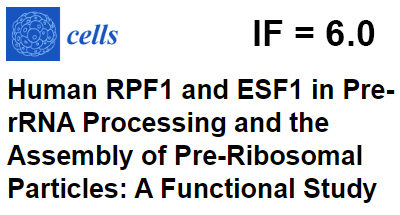Press-room / news / Science news /
Human RPF1 and ESF1 in Pre-rRNA Processing and Assembly of Pre-Ribosomal Particles: A Functional Study
Ribosome biogenesis is a sophisticated time-ordered process, which adjusts the protein synthesis rate to consumption of nutrients and external stimuli. It begins with transcription of the ribosomal primary RNA precursor. 13.3 kB 47S (fig.) pre-rRNA processing is coupled with the sequential recruitment of ribosome biogenesis factors and non-coding RNAs as well as ordered coating of rRNA with ~80 ribosomal proteins during formation of the functional 60S and 40S ribosomal subunits.
The main stages of ribosome biogenesis are similar in different groups of eukaryotes (for example, in lower eukaryotes - Saccharomyces cerevisiae, and higher eukaryotes - Homo sapiens), but in humans this process is much more complicated due to the larger size of pre-rRNA, pre-ribosomes and ribosomes, as well as the emergence of additional regulatory pathways affecting their assembly and function. As a result, in humans a larger number of factors are involved in this process, and proteins that have homologues in yeast can perform additional functions. Despite the breakthrough in obtaining Cryo-EM structures of human ribosome precursors in recent years, a large amount of both structural and functional data remains to be obtained.
In this work, the scientists from the Department of functioning of living systems IBCh RAS demonstrated the involvement of early (nucleolar) ribosome biogenesis factors RPF1 and ESF1 in the maturation of 60S and 40S subunits, respectively. Knockdown of these proteins using shRNA expression demonstrated a unique change in the pre-rRNA profile in response to the resulting ribosome biogenesis stress. It is extremely important that the deficiency of these proteins in human cells, unlike yeast cells, is not fatal and does not lead to a change in the polysome profile, which allows us to argue about the probable rearrangement of the process to maintain the translational activity of cells. Based on the results obtained, authors suggest that the RPF1 and ESF1 proteins perform a structural function and contribute to the correct folding of RNA-protein complexes for further stages of pre-rRNA processing.
The results are published in Cells.

march 6


